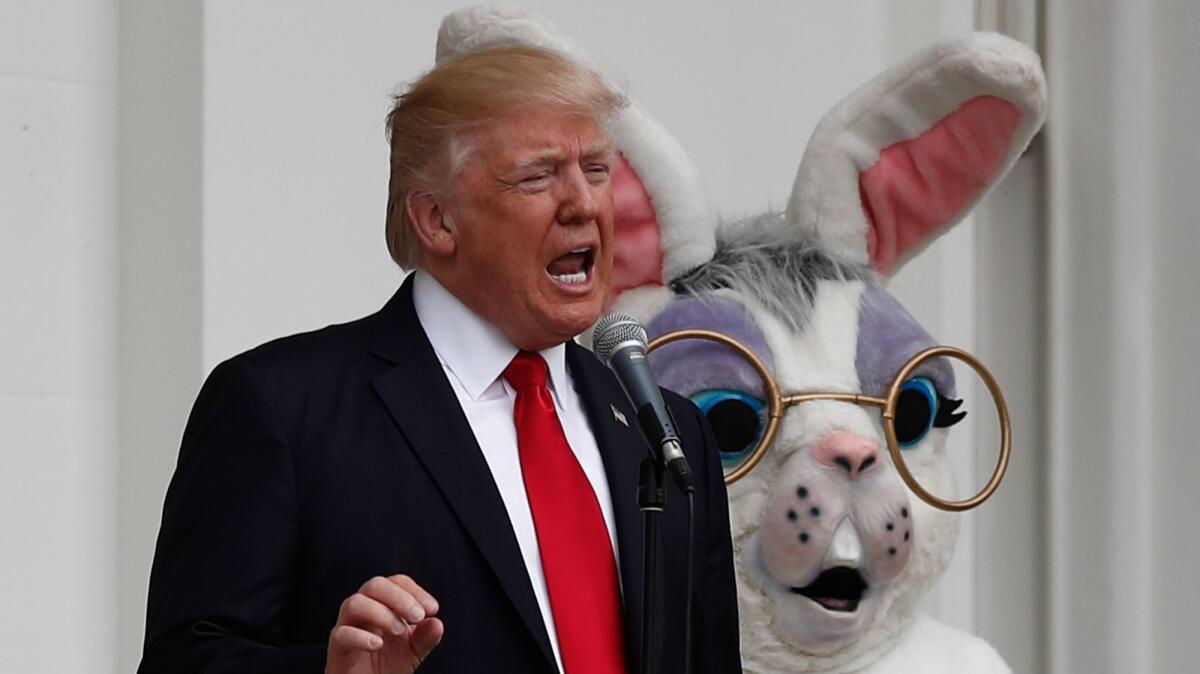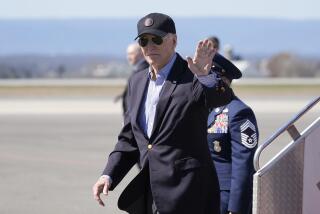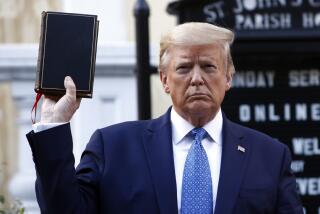Op-Ed: Is Trump religious? Who cares?

Donald Trump celebrated Easter in an Episcopal church in Palm Beach, where he gave a thumbs-up sign to the congregants before taking his seat in a pew near the front. His appearance on the major Christian holiday was another data point in an ongoing debate about whether the president is a true believer or merely signaling religiosity to appease his base.
During the campaign, he referred to Second Corinthians as “Two Corinthians” and couldn’t name his favorite Bible verse. The church he claimed as his own, in Manhattan, released a statement that he was not an “active member.” Shortly after his inauguration, he mistook a communion plate for an offertory plate. Recently Politico noted an uptick in Trump’s religious references. “Has Trump found religion in the Oval Office?” a headline asked. The answer from several of Trump’s biographers was no. “Donald has never been a spiritually or religiously serious person,” Timothy O’Brien, author of “TrumpNation: The Art of Being Donald,” told Politico.
Good to know, I guess. But Trump’s religion (or lack thereof) is one of the least revealing things about him. Even if churchgoing habits are a proxy for a president’s moral code, there’s no need for one in Trump’s case because he’s already given us plenty of direct information about his values — in the comments he’s uttered, the tweets he’s sent, the policies he’s championed and the people he’s chosen to surround himself with.
We know he likes to comment on women’s bodies, and has bragged about grabbing them without their consent. We know he pals around with white nationalists and appoints them to the highest levels of government. We know he evinces little interest in policies to help the working poor, and displays contempt for people seeking refuge from persecution. We know he’s obsessed with being seen as a winner. We know that when he isn’t, he is petty and vindictive. Actions speak louder than prayers.
Actions speak louder than prayers.
Despite the Constitution’s assurances that “no religious test shall ever be required as a qualification to any office,” Americans love to conflate religiosity with morality. Barack Obama’s spiritual practices were also under a microscope at the beginning of his first term. And while the interest in how Trump worships has none of the racist undertones that accompanied questions about Obama’s choice of church, it’s just as much of a waste of time. I couldn’t care less whether he’s cracking open a Bible every night, warming a pew on Sundays or seeking a pastor’s approval.
Most presidents in the modern era, no matter what their professed religious affiliation, haven’t attended church regularly, either. Even George W. Bush, beloved as he was by evangelical Christians, did not worship with the same congregation every week while he was in office. And yet it’s difficult to imagine a candidate who doesn’t end her speeches with “God bless America” attracting a significant portion of the vote. No serious presidential contender in recent history has declared that he doesn’t believe in a higher power.
This fixation on the president’s church attendance and religious bona fides strikes me as not only unhelpful but rather hypocritical, given that most Americans don’t go to church every week — not even those who profess a belief in God.
As of 2014, 76% of Americans identified as religious, but only 36% said they attended services weekly. And the number of Americans with no religious beliefs or affiliations has risen sharply in recent years. The Pew Research Center calls members of this growing group “nones,” and they comprise more than a quarter of Democratic voters.
The fact that I’m a “none” myself probably explains some of my indifference to figuring out Trump’s true religious beliefs. But I do care deeply about the president’s moral compass and decision-making process, and some of the questions about his religious influences have yielded interesting answers. In a 2015 campaign event in Iowa, Republican pollster Frank Luntz asked Trump, “Have you ever asked God for forgiveness?”
“That’s a tough question,” Trump responded. “I don’t think in terms of — I’m a religious person.” He went on to praise Norman Vincent Peale, who was his childhood pastor and officiated his first wedding. Peale wrote “The Power Of Positive Thinking,” and is widely recognized as one of the first religious leaders to preach the prosperity gospel, which presents faith as the path to financial success. Indeed, material wealth is a Trump value that most of us would recognize as consistent with his public statements and policy choices. And it’s no wonder that a man who was born rich would eagerly equate money with morality.
Upon hearing this answer, Luntz, to his credit, persisted. “But have you ever asked God for forgiveness?”
“I’m not sure I have,” Trump replied. “When I drink my little wine — which is about the only wine I drink — and have my little cracker, I guess that’s a form of asking for forgiveness.”
Ann Friedman is a contributing writer to Opinion. She lives in Los Angeles.
Follow the Opinion section on Twitter @latimesopinion or Facebook
More to Read
A cure for the common opinion
Get thought-provoking perspectives with our weekly newsletter.
You may occasionally receive promotional content from the Los Angeles Times.






